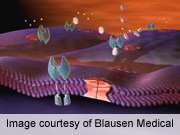(HealthDay)—Higher consumption of coffee is associated with lower risk of type 2 diabetes, according to research published in the February issue of Diabetes Care.
Ming Ding, of the Harvard School of Public Health in Boston, and colleagues conducted a systematic review of the literature and performed a meta-analysis of 28 prospective cohort or nested case-control studies. The authors sought to assess the effect of coffee consumption on risk of type 2 diabetes.
The researchers found that, compared with no coffee or rare consumption of coffee, the relative risk (RR) for type 2 diabetes was 0.92 (95 percent confidence interval [CI], 0.90 to 0.94) for one cup per day; 0.85 (95 percent CI, 0.82 to 0.88) for two cups per day; 0.79 (95 percent CI, 0.75 to 0.83) for three cups per day; 0.75 (95 percent CI, 0.71 to 0.80) for four cups per day; 0.71 (95 percent CI, 0.65 to 0.76) for five cups per day; and 0.67 (95 percent CI, 0.61 to 0.74) for six cups per day. No significant difference was found between the reduced risk of diabetes associated with a one cup per day increase for caffeinated coffee (RR, 0.91; 95 percent CI, 0.89 to 0.94) versus decaffeinated coffee (RR, 0.94; 95 percent CI, 0.91 to 0.98) (P for difference = 0.17).
"Coffee consumption was inversely associated with the risk of type 2 diabetes in a dose-response manner," the authors write. "Both caffeinated and decaffeinated coffee was associated with reduced diabetes risk."
More information:
Abstract
Full Text (subscription or payment may be required)
Journal information: Diabetes Care
Copyright © 2014 HealthDay. All rights reserved.























